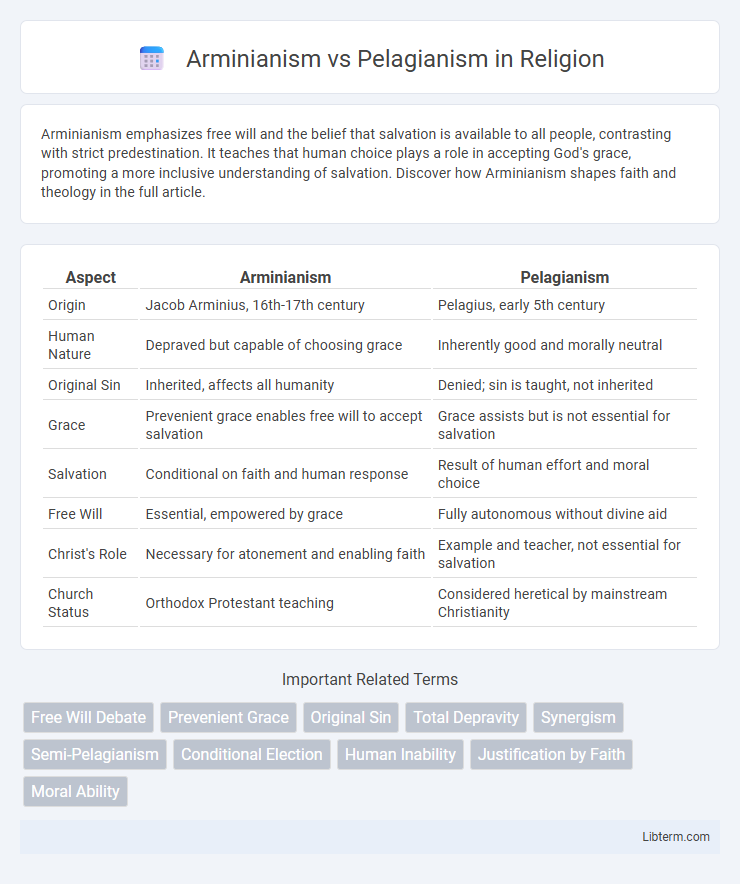Arminianism emphasizes free will and the belief that salvation is available to all people, contrasting with strict predestination. It teaches that human choice plays a role in accepting God's grace, promoting a more inclusive understanding of salvation. Discover how Arminianism shapes faith and theology in the full article.
Table of Comparison
| Aspect | Arminianism | Pelagianism |
|---|---|---|
| Origin | Jacob Arminius, 16th-17th century | Pelagius, early 5th century |
| Human Nature | Depraved but capable of choosing grace | Inherently good and morally neutral |
| Original Sin | Inherited, affects all humanity | Denied; sin is taught, not inherited |
| Grace | Prevenient grace enables free will to accept salvation | Grace assists but is not essential for salvation |
| Salvation | Conditional on faith and human response | Result of human effort and moral choice |
| Free Will | Essential, empowered by grace | Fully autonomous without divine aid |
| Christ's Role | Necessary for atonement and enabling faith | Example and teacher, not essential for salvation |
| Church Status | Orthodox Protestant teaching | Considered heretical by mainstream Christianity |
Introduction to Arminianism and Pelagianism
Arminianism centers on the belief in conditional election based on foreseen faith, emphasizing free will's role in accepting salvation, while Pelagianism denies original sin and asserts that humans can achieve righteousness through their own efforts without divine grace. Arminian theology arose as a response to Calvinism, advocating that God's prevenient grace enables but does not ensure human choice toward salvation. Pelagianism, originating from Pelagius in the 4th century, was condemned as heresy due to its rejection of original sin and the necessity of grace for moral development.
Historical Origins and Key Proponents
Arminianism originated in the early 17th century, founded by Jacobus Arminius, who sought to challenge strict Calvinist predestination with a focus on free will and conditional election. Pelagianism traces back to the 4th century, attributed to Pelagius, emphasizing human ability to choose good without the necessity of divine grace. Key proponents of Arminianism include theologians like John Wesley, while influential defenders of Pelagianism were condemned by Augustine of Hippo for undermining original sin doctrine.
Core Doctrines of Arminianism
Arminianism centers on free will, conditional election, and resistible grace, emphasizing human responsibility in accepting salvation. It rejects the doctrine of predestination as unconditional and argues that prevenient grace enables believers to choose or reject God's offer of salvation. Unlike Pelagianism, Arminianism asserts original sin's impact on humanity yet upholds that divine grace is necessary for any good action or faith.
Core Doctrines of Pelagianism
Pelagianism centers on the belief in human free will and the inherent ability to achieve moral perfection without divine grace, emphasizing that original sin did not corrupt human nature. It teaches that Adam's sin affected only himself, and all humans are born morally neutral, capable of choosing good or evil independently. Core doctrines include the denial of original sin's transmission and the assertion that grace is an aid rather than a necessity for salvation, contrasting with Arminianism's emphasis on prevenient grace enabling salvation.
Views on Free Will and Human Nature
Arminianism asserts that human free will is enabled by prevenient grace, allowing individuals to respond to God's call without being irresistibly determined, emphasizing a cooperative synergy between divine grace and human choice. Pelagianism denies original sin's corrupting effect, maintaining that humans possess an innate ability to choose good independently of divine aid, thus upholding a strict form of libertarian free will and inherent moral capability. These contrasting views on free will and human nature significantly shape their respective doctrines on salvation, grace, and human responsibility.
Perspectives on Original Sin
Arminianism teaches that original sin has weakened human nature, making individuals naturally inclined to sin but still capable of choosing grace through free will. Pelagianism denies original sin, asserting that humans are born morally neutral and fully able to live without sin through their own efforts. The theological debate centers on the extent of human depravity and the necessity of divine grace for salvation.
Grace, Salvation, and Predestination
Arminianism emphasizes prevenient grace enabling human free will to accept or reject salvation, contrasting Pelagianism's denial of original sin and assertion that grace is unnecessary for righteous living. Salvation in Arminianism depends on faith activated by grace, while Pelagianism teaches that individuals can achieve salvation through moral effort without divine grace. Regarding predestination, Arminianism supports conditional election based on foreseen faith, whereas Pelagianism rejects predestination altogether, affirming human autonomy in attaining salvation.
Scriptural Support and Interpretations
Arminianism emphasizes prevenient grace, citing scriptures like John 3:16 and Romans 5:18-19 to support human free will empowered by God's enabling grace. Pelagianism, often criticized for minimizing original sin, interprets passages such as Deuteronomy 30:19 and Matthew 5:48 to argue that humans can achieve righteousness through their natural efforts without divine aid. The debate hinges on biblical interpretations regarding human nature, grace, and salvation, with Arminianism aligning with passages on God's prevenient grace and Pelagianism focusing on the moral responsibility evident in scripture.
Major Theological Controversies
Arminianism and Pelagianism diverge fundamentally on the nature of human free will and divine grace, with Arminianism affirming prevenient grace enables human response to salvation, whereas Pelagianism denies original sin's impact, asserting humans can choose good without divine aid. The major theological controversy centers on original sin and grace's necessity, with Arminianism opposing the denial of inherent human sinfulness found in Pelagian thought. This debate influenced doctrines on predestination, with Arminians advocating conditional election based on faith, contrasting Pelagian emphasis on moral autonomy.
Lasting Influence on Christian Thought
Arminianism has shaped Christian thought by emphasizing free will and conditional election, influencing denominations like Methodism and stressing God's prevenient grace. Pelagianism, largely condemned as heretical, spurred theological clarifications on original sin and divine grace, reinforcing Augustinian doctrines within mainstream Christianity. Both movements continue to impact debates on salvation, human nature, and divine sovereignty.
Arminianism Infographic

 libterm.com
libterm.com